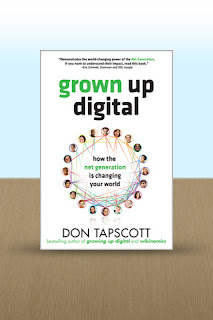Are Millenials Really that Different? - My Review of Grown Up Digital
Are millennial really that different? Do they play, learn, communicate, work and create differently than their parents? Are they smarter or dumber? More or less social? And if so, what should we know about them? More importantly, what should management and companies know about them, because they are the future.
Lots has been written about the so called millennials or Generation Y. I've been following the news and research on them. When Don Tapscott wrote a book about being 'grown up digital' I thought I'd read it. At that time I was becoming more skeptical about the stories about Gen Y. In daily practice I was seeing older colleagues quickly picking up new ways of working, while young colleagues were very reluctant to use new media.
Technically I'm not a millennial. I don't belong to the 'Net Generation'. The generation that has been "bathed in bits". According to Tapscott someone's part of the Net Generation when you're born between 1977 and 1997.
Eight norms
The outline of the book is built around 8 characteristics of the typical Net Gener that differentiate them from their boomer parents. These are:
There's lots of interesting information in this book. The data underlying this book is also shared broadly in colorful(!) tables and diagrams. For instance:
What should companies do?
This book also addresses what companies and institutions should do to meet Millennials needs and norms. Performance feedback, for instance, is extremely important. It increases their loyalty (to a career path, not an employer). Learning should be seen as something you do all your life, not just in school. Companies should decentralize their decision making and embrace new technologies that link employees in teams around the world. Young employees want to add value, make a difference, challenge the status quo, and understand how their work contributes to organizational success. Companies should define policies on using tech in companies to encourage sharing (in the right way). Also relating to Tapscott's biggest concern about Gen. Y: privacy. (p 294, 304) He finds millennials really need help with understanding privacy and how being too open about certain things can thwart their future goals.
The bottom line of the book is: "if you understand the Net Generation, you will understand the future. You will also understand how our institutions and society need to change today." I definitely think that non-Millennial managers and leaders should read this book.
Some interesting quotes
Tapscott shared and interesitng quotes I'd like to share with you (both from page 292):
Samuel Johnson: "Knowledge is of two kinds. We know a subject ourselves, or we know where we can find information upon it."
Rob Cross: "[Who] you know has a significant impact on what you come to know, because relationships are critical for obtaining information, solving problems, and learning how to do your work."
And two of his own:
"It's all about word of mouth - but the word traveled at the speed of atoms, not bits." (p. 274)
"General online activity - hunting for information, reading, and responding - is far from mindless." (p. 290)
Only the rich?
One thing that struck me in the book was the fact that Tapscott points to many Net Geners who seem to have everything they want (including his own kids). I was wondering if this story about millennials also applies to the less-privileged youth. Can they also be characterized in the same way? In other words: is the difference between the boomers and the net generation their access to technology or is it more philosophically-oriented?
Well-balanced
I enjoyed reading this book. The book is well-balanced and convincing. Tapscott addressed the concerns about the new generation, but also underlines their potential. I loved the layout of the book and the use of color (in the diagrams). All-in-all a book I'd recommend you to read.
UPDATE: Here's an interesting different perspective.
Lots has been written about the so called millennials or Generation Y. I've been following the news and research on them. When Don Tapscott wrote a book about being 'grown up digital' I thought I'd read it. At that time I was becoming more skeptical about the stories about Gen Y. In daily practice I was seeing older colleagues quickly picking up new ways of working, while young colleagues were very reluctant to use new media.
Technically I'm not a millennial. I don't belong to the 'Net Generation'. The generation that has been "bathed in bits". According to Tapscott someone's part of the Net Generation when you're born between 1977 and 1997.
Eight norms
The outline of the book is built around 8 characteristics of the typical Net Gener that differentiate them from their boomer parents. These are:
- They prize freedom and freedom of choice
- They want to customize things, make them their own
- They're natural collaborators, who enjoy conversation, not a lecture
- They scrutinize you and your organization
- They insist on integrity, openness
- They want to have fun
- Speed is normal
- Innovation is part of life.
There's lots of interesting information in this book. The data underlying this book is also shared broadly in colorful(!) tables and diagrams. For instance:
- did you know the center of the world is Asia, when you look at the Millennial population?
- did you know research is showing the Net Generation's brain is different from other generations (ch. 4)?
- did you know Gen Y is the smartest generation every (IQ scores are on the rise and they have better social skills)? (p. 110)
- did you know family is a big deal to them and they stay home longer?
What should companies do?
This book also addresses what companies and institutions should do to meet Millennials needs and norms. Performance feedback, for instance, is extremely important. It increases their loyalty (to a career path, not an employer). Learning should be seen as something you do all your life, not just in school. Companies should decentralize their decision making and embrace new technologies that link employees in teams around the world. Young employees want to add value, make a difference, challenge the status quo, and understand how their work contributes to organizational success. Companies should define policies on using tech in companies to encourage sharing (in the right way). Also relating to Tapscott's biggest concern about Gen. Y: privacy. (p 294, 304) He finds millennials really need help with understanding privacy and how being too open about certain things can thwart their future goals.
The bottom line of the book is: "if you understand the Net Generation, you will understand the future. You will also understand how our institutions and society need to change today." I definitely think that non-Millennial managers and leaders should read this book.
Some interesting quotes
Tapscott shared and interesitng quotes I'd like to share with you (both from page 292):
Samuel Johnson: "Knowledge is of two kinds. We know a subject ourselves, or we know where we can find information upon it."
Rob Cross: "[Who] you know has a significant impact on what you come to know, because relationships are critical for obtaining information, solving problems, and learning how to do your work."
And two of his own:
"It's all about word of mouth - but the word traveled at the speed of atoms, not bits." (p. 274)
"General online activity - hunting for information, reading, and responding - is far from mindless." (p. 290)
Good food for thought!
Only the rich?
One thing that struck me in the book was the fact that Tapscott points to many Net Geners who seem to have everything they want (including his own kids). I was wondering if this story about millennials also applies to the less-privileged youth. Can they also be characterized in the same way? In other words: is the difference between the boomers and the net generation their access to technology or is it more philosophically-oriented?
Well-balanced
I enjoyed reading this book. The book is well-balanced and convincing. Tapscott addressed the concerns about the new generation, but also underlines their potential. I loved the layout of the book and the use of color (in the diagrams). All-in-all a book I'd recommend you to read.
UPDATE: Here's an interesting different perspective.



